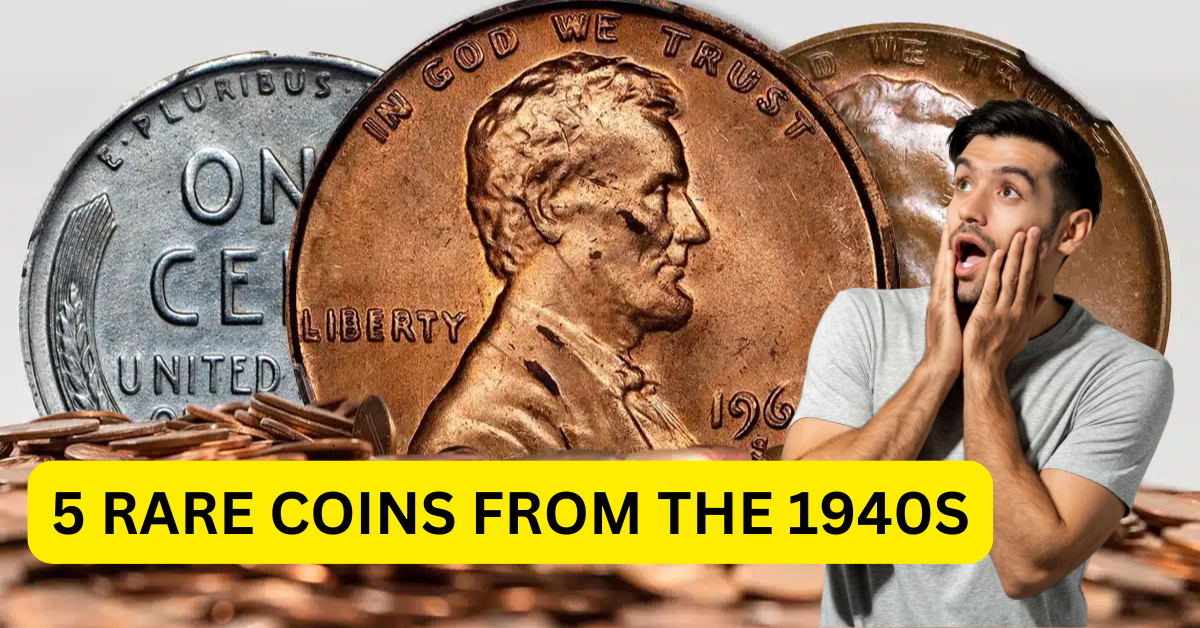If you’ve ever found old coins lying around in your home, you might want to take a closer look.
Coins from the 1940s can be surprisingly valuable, with some worth thousands—or even hundreds of thousands—of dollars to collectors. Whether it’s due to their rarity, historical significance, or unique materials, these coins have become hot commodities in the collectibles market.
Thrugh the publihed article of GoBankingRates, Here’s a breakdown of five coins from the 1940s that could make you rich, along with tips on what makes them so special.
1. Lincoln Wheat Penny (1940s)
The Lincoln Wheat Penny is an iconic piece of U.S. currency, first minted in 1909 to honor Abraham Lincoln’s 100th birth anniversary. Its unique design includes wheat stalks on the reverse and Lincoln’s profile on the front.
Why It’s Valuable:
- Made of 95% copper, with traces of tin and zinc.
- Coins with a rich red color, caused by oxidation, are particularly prized by collectors.
- A rare 1943 bronze penny in excellent condition sold for a staggering $435,000.
What to Look For:
Search for coins with a deep reddish hue or those in mint condition. Their value often depends on their rarity and state of preservation.
2. Jefferson Nickel (1940s)
The Jefferson Nickel is another sought-after coin from this era. Introduced in 1938, these coins feature President Thomas Jefferson on the front and the Monticello estate on the back.
Why It’s Valuable:
- Made of 75% copper and 25% nickel.
- A 1940-D Jefferson Nickel with an MS-68 grade (pristine condition) sold for $21,737.50 at auction.
What to Look For:
While many Jefferson Nickels are still in circulation, rare coins with higher grades—such as MS-68 or above—can fetch significant amounts. Even those in slightly lower grades are worth over $1,000.
3. Walking Liberty Half Dollar (1940s)
One of the most beautiful U.S. coins ever minted, the Walking Liberty Half Dollar features Lady Liberty striding toward a sunrise on the front and a bald eagle on the back.
Why It’s Valuable:
- Made of 90% silver and 10% copper.
- Known for its striking design and historical value.
- Coins graded MS-68 and above are worth around $45,000, with some fetching over $29,000 at auction.
What to Look For:
Check for coins with minimal wear and tear and clear details. The higher the grade, the higher the price.
4. Mercury Dime (1940s)
Also known as the Winged Liberty Head dime, this coin was designed by Adolph Alexander Weinman. The front showcases Liberty wearing a winged cap, often mistaken for the Roman god Mercury, while the reverse features a fasces symbol and olive branch.
Why It’s Valuable:
- Composed of 90% silver and 10% copper.
- A Mercury Dime graded MS-68+FB sold for an incredible $35,250.
What to Look For:
Look for coins with intact details on Liberty’s cap and a well-defined reverse. High-grade coins, especially those graded above MS-67, are worth thousands.
5. Washington Quarter (1940s)
Minted between 1932 and 1964, the Washington Quarter honors George Washington with his profile on the front and a bald eagle on the back.
Why It’s Valuable:
- Made of 90% silver and 10% copper.
- A rare 1940-D quarter graded MS-68 recently sold for $4,060.
What to Look For:
Coins in near-perfect condition with clear details on Washington’s profile and the eagle are the most valuable.
How to Identify and Value Your Coins
To determine if your coin is valuable, consider these steps:
- Examine the Coin’s Condition: Look for coins that show minimal signs of wear.
- Check for Mint Marks: Coins from specific mints (e.g., Denver, marked “D”) often have higher value.
- Get It Graded: Professional coin grading services like PCGS can provide a detailed assessment and grade.
- Research Sale Prices: Look up auction results for similar coins to estimate their market value.
conclusion
Coins from the 1940s hold both historical and monetary value. Many were produced in limited quantities or used unique materials like silver and copper. Additionally, these coins are relics of an era marked by significant events like World War II, adding to their appeal among collectors.
So, before you toss that old jar of coins, take a closer look. You might just uncover a hidden treasure worth thousands.
This article has been carefully fact-checked by our editorial team to ensure accuracy and eliminate any misleading information. We are committed to maintaining the highest standards of integrity in our content.
Filza specializes in simplifying financial topics for everyday readers. Whether breaking down Canada’s tax guides or U.S. benefits like SNAP and VA Disability, Filza’s relatable writing style ensures readers feel confident and informed. Follow her insights on LinkedIn or reach out via email at shewrites.health@gmail.com.
